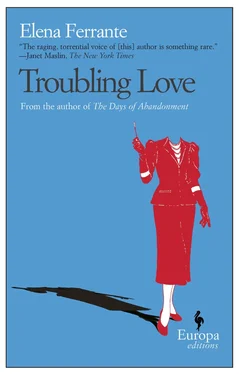“He came back and beat her?” I asked.
The woman admitted reluctantly:
“He showed up here early one morning, not later than six, and threatened to kill her. He said really terrible things to her.”
“When was that?”
“Mid-May: a week before your mother left.”
“And Amalia had already got the dresses and the new lingerie?”
“Yes.”
“And she was pleased?”
“Yes.”
“How did she react?”
“The way she always reacted. She forgot about it as soon as he left. I saw him go out: he was white as a fish in flour. She, on the other hand, nothing. She said: he’s like that; not even old age has changed him. But I understood that things weren’t completely clear. Until she left, until the train, I kept saying to her: Amalia, be careful. Nothing. She seemed tranquil. But on the way she had trouble keeping up her normal pace. She slowed down on purpose. In the compartment she started laughing for no reason and began to fan herself with a hem of her skirt.”
“What’s wrong with that?” I asked.
“It’s not done,” the widow answered.
I took two cherries with joined stems and hung them on my outstretched index finger, swinging them to the right and the left. Probably in the course of her existence Amalia had given up doing many things that, like every human being, she might legitimately or not legitimately have done. But perhaps she only pretended not to have done them. Or perhaps she had given the appearance of someone who pretends, so that my father would be constantly thinking of her unreliability and suffer for it. Perhaps that was her way of reacting. But she hadn’t taken into account that we, her daughters, might think that, too, and forever: I above all. I couldn’t remake her innocent. Not even now. It was possible that Caserta, looking for her companionship, had only been pursuing a fragment of his youth. But I was sure that Amalia was still playing the game with herself, opening the door with youthful mischief, pulling the curl over her eyebrows and batting her eyelashes. It was possible that with that nonsense of the businessman full of ideas the old man had only wanted to communicate his fetishism in a discreet way. But she hadn’t pulled back. She had immediately laughed knowingly at the exchange, and had supported it with her own and his senile impulses, using me and my birthday. No, yes. I realized that I was summarizing a woman without prudence and without the virtue of fear. I had memories of it. Even when my father raised his fists and struck her, to shape her like a stone or a log, she widened her eyes not in fear but in astonishment. She must have widened her eyes in the same way when Caserta proposed the exchange. With joyful astonishment. I, too, was astonished, as if watching a scene of violence, a game for two created from conventions: the scarecrow that doesn’t scare, the victim who isn’t annihilated. It occurred to me that ever since she was a girl Amalia had thought of hands as gloves, silhouettes first of paper, then of leather. She had sewed and sewed. Then, moving on, she had reduced widows of generals, wives of dentists, sisters of magistrates to measurements of bust and hips. Those measurements, taken by discreetly embracing, with her seamstress’s tape, female bodies of all ages, became paper patterns that, fastened to the fabric with pins, portrayed on it the shadows of breasts and hips. Now, intently, she cut the material, stretched tight, following the outline imposed by the pattern. For all the days of her life she had reduced the uneasiness of bodies to paper and fabric, and perhaps it had become a habit, and so, out of habit, she tacitly rethought what was out of proportion, giving it the proper measure. I had never thought about this, and now that I had I couldn’t ask her if it really had been like that. Everything was lost. But, in front of Signora De Riso as she ate cherries, I found that that final game of fabrics between her and Caserta, that reduction of their underground history to a conventional exchange of old garments for new, was a sort of ironic fulfillment. My mood abruptly changed. I was suddenly content to believe that her carelessness had been thought out. Unexpectedly, surprisingly, I liked that woman who in some way had completely invented her story, playing on her own with empty fabrics. I imagined that she hadn’t died unsatisfied, and I sighed with unexpected satisfaction. I took the cherries that I had been playing with and hung them over one ear. I laughed.
“How do I look?” I asked the old woman, who meanwhile had piled up in her cupped palm at least ten pits.
She scowled uncertainly.
“Good,” she said, without conviction.
“I know,” I declared, with, instead, an air of satisfaction. And I chose two more cherries with joined stems. I was about to put them on my other ear, but I changed my mind and held them out to Signora De Riso.
“No,” she defended herself, drawing back.
I got up, walked behind her, and, as she shook her head, laughing nervously, flushed, freed her right ear from the gray hair and placed the cherries on the auricle. Then I stood back to admire the sight.
“Beautiful!” I exclaimed.
“No,” the widow murmured, embarrassed.
I chose another pair of cherries and went back behind her to adorn the other ear. Afterward I embraced her, crossing her arms over her large bosom and hugging her hard.
“ Mammina ,” I said to her. “It was you who told my father everything, isn’t that true?”
Then I kissed her wrinkled neck, which was rapidly turning red. She squirmed in my arms, whether from uneasiness or the wish to free herself, I don’t know. She denied it, said that she would never do that: how could that occur to me?
She had, however, done it — I thought. She had played the spy, in order to hear him shout, slam doors, break dishes, enjoying it anxiously from within the nest of her apartment.
The telephone rang. I kissed her again, hard, on her gray head, before going to answer: it was already the third ring.
“Hello,” I said.
Silence.
“Hello,” I repeated, calmly, as I observed Signora De Riso staring at me hesitantly and meanwhile struggling to get up from her chair.
I hung up.
“Please, stay a little longer,” I invited her, becoming formal again. “Would you like to give me the pits? Eat the rest of the cherries. Just one more. Or take them with you.”
But I felt that my tone was not reassuring. The old woman was standing now and was heading toward the door, with the cherries astride her ears.
“Are you angry with me?” I asked her, in a placating voice.
She looked at me in amazement. She must suddenly have thought of something that stopped her in her tracks.
“That dress,” she said to me, in bewilderment, “how did you get it? You shouldn’t have. It was in the suitcase with the other things. And the suitcase was never found. Where did you get it? Who gave it to you?”
As she spoke, I saw that her pupils were switching rapidly from astonishment to fear. I wasn’t happy about that, I hadn’t intended to frighten her, I didn’t like causing alarm. I smoothed the dress with the palms of my hands as if to make myself taller; constricted by that short, close-fitting dress, too stylish, unsuitable for my age, I felt apprehensive.
“It’s only fabric without memory,” I murmured. I meant that it could do no harm to either me or her. But the widow De Riso hissed:
“It’s dirty.”
She opened the door and closed it behind her quickly. Just then the telephone rang again.
I let it ring two or three times. Then I lifted the receiver: buzzing, distant voices, indecipherable sounds. I repeated “hello” without hope, just so that Caserta would know that I was there, that I wasn’t frightened. Finally I hung up. I sat down at the kitchen table, took the cherries off my ear, and ate them. By now I knew that all the calls that followed would have the pure function of a reminder, a sort of whistle like the one that in the past men used when they wanted to announce from the street that they were coming home and the women could put the pasta on.
Читать дальше












